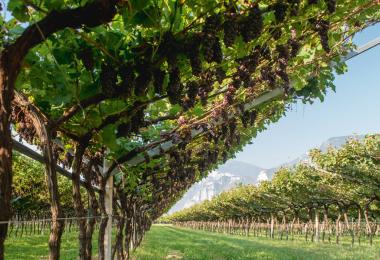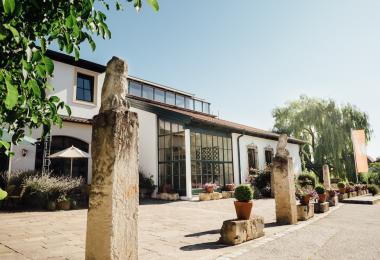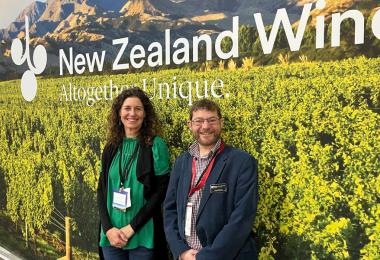To Russians, it’s SPB, or just Piter. Founded in 1703, Saint Petersburg was the Russian capital from 1712 to 1918 and its centre is a UNESCO World Heritage site. Divided by the whimsical Neva River, known for overflowing, as well as its canals, the city has a rich wine culture as well as abundant fresh water.
The buzz
There’s a different kind of energy in St Petersburg. “St Petersburg is more about enjoying life than Moscow,” says Snezhana Revchuk, who co-owns the Molto Buono restaurant and a tiny wine importer called Diletant Wine. The observation is one that many locals working in the city’s wine business agree with, noting that it has a slower pace of life.
The wages are different, too. While the average Moscow salary is about Rb800,000 ($12,514), St Petersburg, just 600km north-west, averages about Rb540,000 ($8,447), a whopping 33% less. But despite having a smaller population with less money to spend, St Petersburg’s concentration of wine bars and restaurants, and enthusiastic wine drinkers, seems higher. “With less population, the news of opening wine venues spreads faster,” says Natalia Zubova, who is in charge of development for the small wine importer Wine & Only.
Numbers might be less in “the Russian Venice”, yet tourism is strong. Millions visit each year, and their spending represents a big chunk of local on-trade revenues. Not everybody benefits equally, though. “We’ve got 80% tourists during the high season,” explains Evgeny Usachev, who co-owns several restaurants, Hamlet+Jacks being one of them. “Every second guest is a tourist in summer,” says Leonid Sternik, a sommelier who co-owns the Vincent restaurant, located just in front of the world-famous Mariinsky Theatre. Across the river, tourist numbers are much lower: the patrons of prominent restaurateur Aram Mnatsakanov’s Probka,are only 20% sightseers, according to chef-sommelier Ekaterina Yatsenko. Virtually none reach the meat restaurant Beefzavod, says sommelier Evgeny Shamov.
While the tourist flow definitely helps the city’s restaurants, there’s yet another fact that’s driving people to explore the city’s dining scene. In 2019, two restaurants entered the San Pellegrino Best Restaurants list, with chef Dmitry Blinov’s Harvest awarded 92nd place and chef Igor Grishechkin’s CoCoCo ending up number 104 out of 120 – not bad considering Moscow has only two restaurants on the list, being White Rabbit at number 13 and Twins Garden at 19.
As a rule, dynamic chefs attract young and dynamic sommeliers. “Our mission is to inspire those guys who are willing to go the independent road as we do,” says Artem Grebenschikov, chef and owner of the well-respected Bourgeois Bohemians. The venue’s sommelier Anton Belochkin adds: “I definitely like when people select wines first and food to match it afterwards.” The hallmark of such places is excellent yet affordable food and a wine list comprised of smaller, lesser-known producers.
Affordability is something professionals notice about St Petersburg. “Today wine can be enjoyed everywhere, from pizzerias to high-end restaurants. There’s also beer and coffee culture rising; cocktail bars are back on stage too,” says Usachev. He is right: for example, a Mexico-themed bar called El Copitas has, for the second time in two consequent years, earned a place in The World’s 50 Best Bars list in 2019, the only one in Russia to do so and surely setting a precedent many will hope to follow.
More restaurants are introducing a sommelier position to their venues. Observes Blinov, the co-owner of Harvest: “I’m interested that my somm works directly with guests, rather than doing paperwork and making wine lists.” Kristina Veselova is dealing with all four of Blinov’s venues and working full time at Harvest. “I’m not here to puzzle my guests. We have mostly classics-oriented people here,” she says.
The St Petersburg-born Ginza Project, with a staggering 120 restaurants under ownership or management (mainly in St Petersburg and Moscow), serves the more classic drinker and eater. Among its restaurants are Mansarda, Terrasa, The Repa and dozens of others, which offer more conventional wine lists offset by panoramic views over the city’s main sights.
The tight-knit professional wine community is on the move. “There are just more interested people here: they taste wines, they travel to wine fairs together,” says Julia Tsakhaya of importer Real Authentic Wine.
“The professional market is clearly divided into two parts: young and dynamic, and everybody else,” says Nikolai Utebekov, from Vinoterra wine importer. The city’s venues tend to offer less commercial wines, many insiders point out. “It’s rare to find the ordinary wine lists arranged by wine regions; there are more organoleptic-based, ideas-driven lists,” says Dmitry Zhurkin, the head of wine at Ladoga Group. Venues with more conservative guests offer them more familiar wine brands, which some of the hipper sommeliers refer to as “wines from the 2000s”.
The urge to offer better value to restaurant-goers is pushing some professionals to stop looking at anything except prices, dramatically reducing the quality of wine lists. On the other hand, creative sommeliers have opportunities to offer unknown wines at great prices to discerning and interested buyers. St Petersburg has a more natural/organic focus than Moscow, where artisanal wines may not be so available because of the sheer volumes that sommeliers need to be able to serve customers.
While there are a great number of dedicated wine shops in town, most of their stock is drawn from a single portfolio. Examples include Monopol shops by Ladoga, SimpleWine shops by Simple, Alta Vina shops by OKV, Aromatny Mir by Aroma Trade and others. Conceptually speaking, they do not break new ground.
By contrast, Wine Warehouse (Vinny Sklad) stands out. It is run and managed by RAW Wine, Marine Express and Ginza Project, all pillars of the St Petersburg wine scene. The place is built as a warehouse that has a trendy wine bar inside and a unique atmosphere that is just waiting to be replicated by rivals. “All of our sales force are all-in-one people: cashiers, managers, consultants, sommeliers, friends,” says manager Olga Yuriyeva. “Some 30% of our clients drink only classic wines, while others are shifting. We, for example, carry 83 Champagnes, and we want a hundred.”
The wine trade
Market watchers agree that St Petersburg’s wine market is about one quarter the size of Moscow’s. Big and medium-sized companies with head offices in Moscow would sell 10% of their stock in St Petersburg. The city is clearly more important for local distributors such as Marine Express, Lagoda, Nesco, Centrobalt and Degrees Trade to name just a few. Corporate sales are very limited here, considering the big companies are headquartered in Moscow.
Private sales are more promising. “For every bottle drunk in the restaurant you can image [customers would] drink two at home,” says Utebekov. Another rising trend is restaurants importing on their own account, which is gaining traction. Private label is also growing; Aram Mnatsakanov was a pioneer of putting private label wines on the list and importers such as Marine Express now offer brokerage services.
The most significant Moscow-based wine distributors have a strong office representation and dedicated storage in town.
There’s an overall feeling that St Petersburg has a big wine future ahead of it, and that it may be a better point of entry for wineries seeking to get into the Russian market. It’s also worth mentioning that the big wine fairs held in Moscow, such as Vinitaly and the Spanish Wine Salon, are also brought to St Petersburg.
There’s a strong educational element to the city’s wine culture, too, with eight wine academies, including Igor Sharbatov’s wine school, Pro Sommelier, Millesime, Enotria, Wine Academy, Marine Express Wine School, WineJet and WineMasters. All of them offer courses and employ wine educators and some also offer WSET courses. “You would be surprised at how successful they all are,” says wine educator Anna Baranova.
St Petersburg may not be the right destination for big wineries that need big sales, but medium to smaller-sized wineries will feel at home here. Even better, the city has had a new electronic visa process since October 2019, which means travel to St Petersburg can be done without a Russian visa. Visitors can stay up to a week at a time.
Anton Moiseenko
This article first appeared in Issue 6, 2019 of Meininger's Wine Business International magazine, available by subscription in print or digital.








